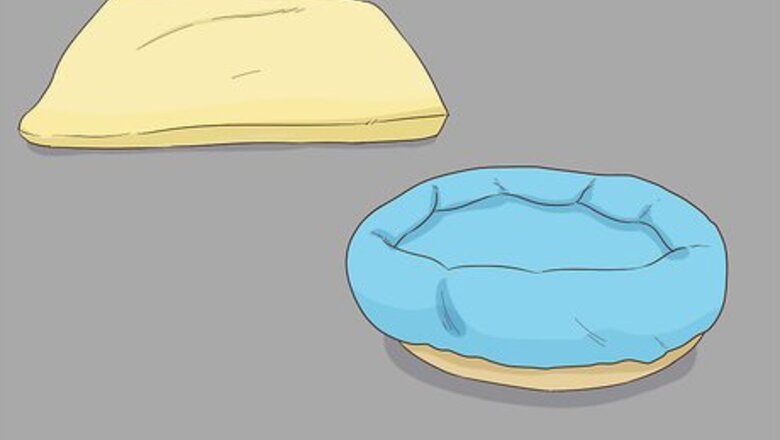
views
Providing Alternatives
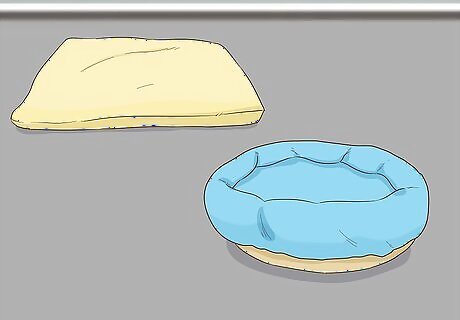
Buy a comfortable pet bed for your dog. Pay attention to how your dog likes to sleep and then buy a bed that supports its sleeping style. For example, if your dog usually curls up into a ball on the couch, buy a donut or bolster bed. If your dog likes to spread out on the couch, purchase a soft, cushion bed. Make sure that the bed is the right size for your dog. If you're uncertain or if your dog is between sizes, order a size up. It's better to get a bigger bed just in case, because smaller beds can lead to spine and neck problems
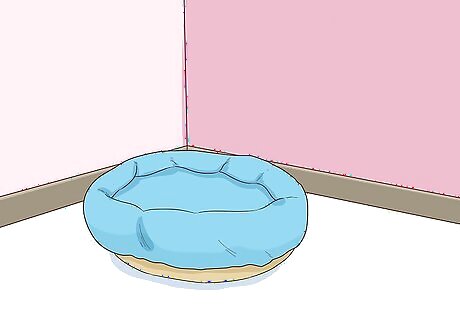
Make a place for your dog's bed. Place your dog's bed on the floor in a quiet room (if the dog likes to be undisturbed when it sleeps) or in a corner of the living room (if the dog wants to be around the activity of the house). Put a few of the dog's toys near the bed to encourage the dog to use it.
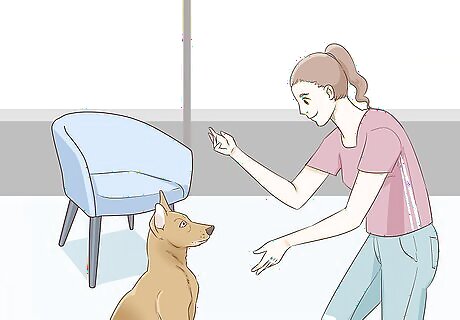
Designate a piece of furniture as the dog's. If your dog is disinterested in a dog bed or you don't want to buy one, pick a chair or piece of furniture that can be just for the dog. Don't let any other pets or people use the furniture. Your dog may be confused at first about why it can use one piece of furniture but not the couch. Be consistent in keeping the dog off of the couch and it will soon learn to stick with its own furniture. Do not try to section off a part of the couch for the dog. The dog may not understand why it is allowed on one part of the couch and not the other. The dog should have a completely separate piece of furniture.
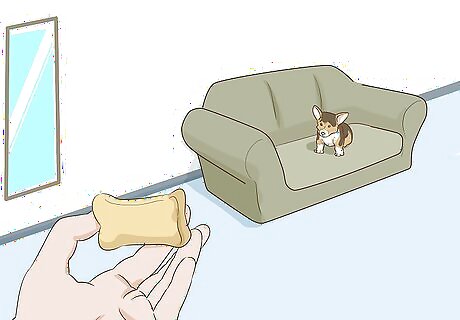
Use treats to encourage the dog to use its furniture. One of the simplest ways to teach the dog to use its bed or furniture is to set a dog treat on it. Do this several times throughout the day so your dog associates its bed with a positive experience. Eventually, your dog should come to prefer its furniture instead of the couch. You can also reward the dog with treats whenever you see it relaxing on its furniture.
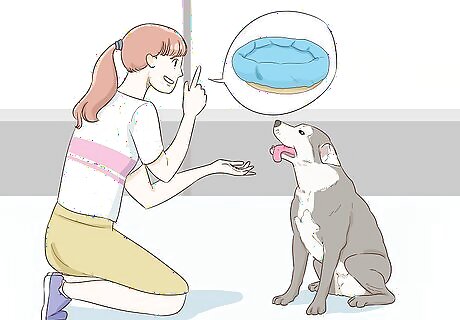
Teach your dog the "go to bed" command. Start telling your dog to "go to bed" whenever you want it to use its own furniture or bed. At first, reward the dog whenever it touches or sits on its own bed. After a week or 2, start rewarding the dog only after it lies down on the bed for a certain amount of time. Soon, your dog will start to go to bed whenever you give it the command.
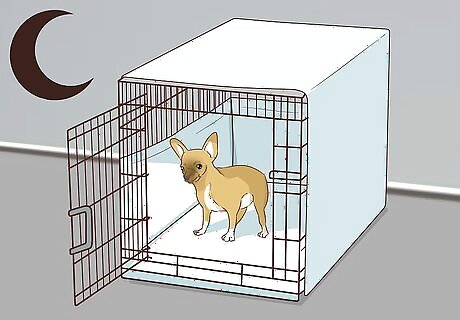
Keep your dog in a crate or different room at night. Restrict your dog's access to the couch when you won't be around to keep it off. Put your dog in a crate or in a separate room in the evenings so it won't get into the habit of sleeping on the couch. Set out the dog bed or comfortable blankets so your dog won't miss sleeping on the couch.
Making Furniture Less Desirable
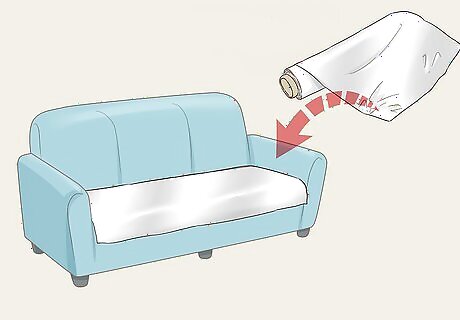
Place sheets of aluminum foil on the furniture. Ensure that the length of the couch is covered with the aluminum foil so it will startle your dog if it jumps onto it. Putting down aluminum foil is a good option if you want to keep the dog off of the couch while you're not home. If you don't have aluminum foil, lay large pieces of bubble wrap on the couch. The dog may pop some of the bubbles when it gets on the couch. This can startle the dog so it won't want to get back on the furniture.
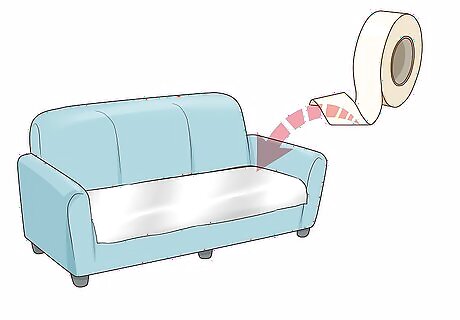
Lay double-sided packing tape on the couch. If your dog is sensitive to noise and doesn't respond well to being startled by aluminum foil, lay down long strips of double-sided packing tape instead. The sticky feeling can prevent the dog from jumping on the couch and scratching the furniture.
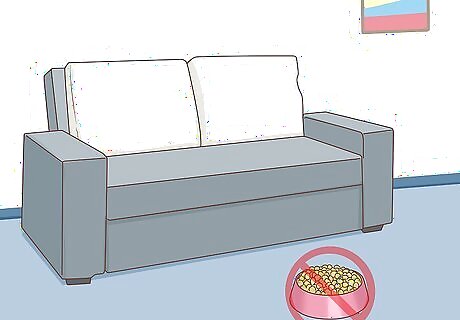
Avoid leaving food near the furniture. Your dog may be drawn to the couch because you frequently eat there or leave crumbs on it. If you stop eating on the couch or remove the crumbs once you've finished eating, your dog will be less interested in the furniture.
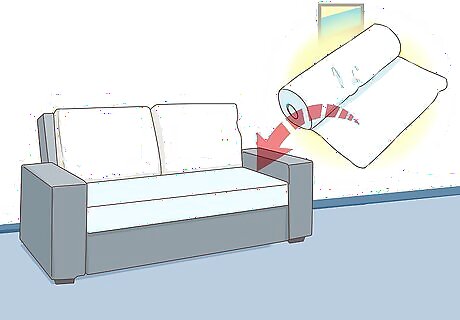
Protect the couch with covers. It may take some time for your dog to learn not to get on the couch. In the meantime, protect the couch by covering it with a plastic cover, sheet, or blanket. You can easily remove the cover once your dog begins using its own bed or space instead.
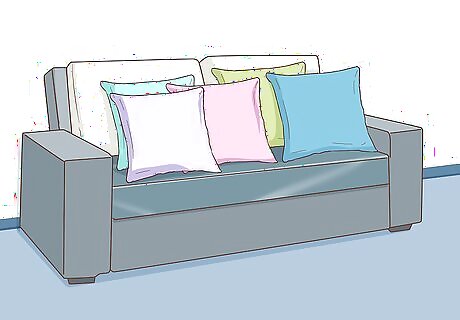
Make the furniture hard for your dog to access. Your dog will be less likely to get on the couch if it's covered with things such as cushions, blankets, or baskets of laundry. Even if your dog manages to get on the couch, it will find that there's no comfortable space to rest and the dog should jump off.
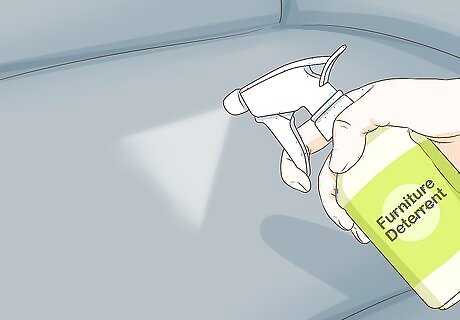
Spray a furniture deterrent on the couch. Go to the pet store and buy a non-chemical furniture deterrent that you can apply to the furniture. These are formulated to smell bad to dogs so your dog should leave the couch alone. Follow the manufacturer's instructions about reapplying the spray once the scent wears off.
Teaching the "Off" Command
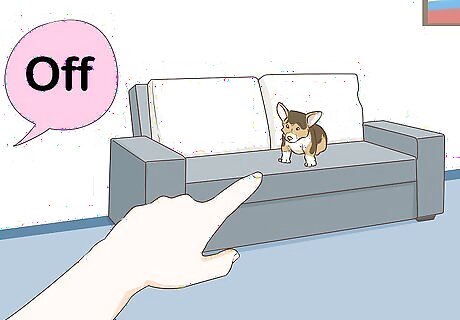
Say "off" when you see your dog get on the couch. Spend some time monitoring your dog around the couch. Wait to see if your dog will stay away from the couch and go to its own furniture or space. If your dog does get on the couch, say "off" in a firm voice. Do this as soon as you see the dog on the furniture. Avoid yelling or getting angry at the dog. Yelling will only damage your relationship with the dog. When you give the command, try pointing to the ground. This will help your dog learn the cues for getting off of the couch.
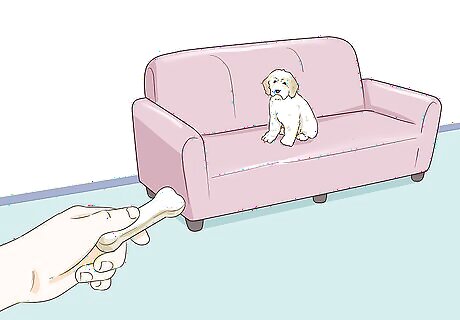
Give the dog a treat to encourage it to move. Get out a dog treat and hold it in front of your dog's face right after you tell it to get off the couch. Move the treat away from the dog and lure the dog to its bed. This will encourage your dog to move off the couch and onto its own bed. You shouldn't move the dog off of the couch or it won't learn that it shouldn't be on the furniture in the first place.
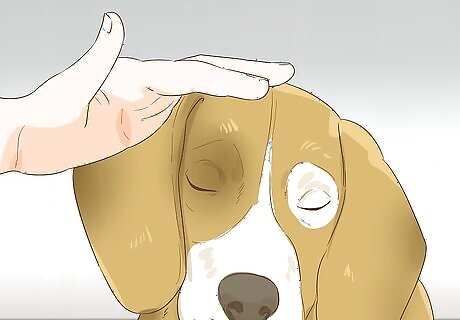
Praise the dog when it gets off of the furniture. As soon as the dog jumps off of the couch and onto the floor, say something like "good job!" Rub the dog's ears or pet it as another reward for keeping off of the couch. If your dog prefers, get out one of its favorite toys and play together for a few minutes as a reward. Remember to be consistent with your praise. Praise the dog every time it gets back onto the floor so it learns that the couch is off limits.
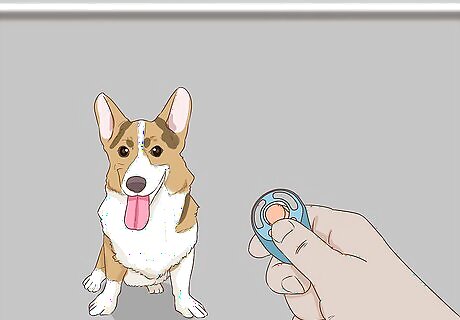
Use a clicker device to train the dog. Buy a clicker device and get your dog excited about hearing the click. Give your dog a treat and click the device at the same time. Do this about 10 times so your dog associates the sound with a reward. Then, use the clicker to reward your dog for avoiding the couch or jumping down off of the couch. For example, click the device when you see the dog in its own dog bed or space. Click the device as soon as you see behavior that you want to reward. This will strengthen the positive association that the dog has with staying off of the couch.




















Comments
0 comment